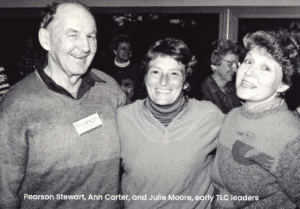It's been a busy spring for TLC. Here's some recent coverage of our goings-on: N&O:…

As you read TLC’s first newsletter on our blog, you will see how much TLC and the region have grown and changed since 1983. You may also be struck by how much is still the same — from concerns about the rapid development of the region to our mission to protect natural and historic lands in the Triangle region and hold these lands in public trust.
Even TLC’s commitment to conserving land FOR people has remained steady: “TLC knows that protecting natural, open spaces for scenic, education, and recreational pleasure is important to people.
Preserving the areas in perpetuity will guarantee that these places remain attractive features of our region.” We are so grateful for these visionaries. The volunteer founders also talked about the Critical Land Program — a plan to identify and protect lands with exceptional value to communities in the region. Planning along with stakeholders remains central to our work.
It is gratifying to see how TLC has shown both a continuity of purpose and the ability to strategically innovate.
We opened White Pines Nature Preserve in 1986 with 3 miles of trail. Since then, we expanded White Pines by 229 acres and 2.8 miles of trail. TLC staff, with help from thousands of supporters, have also conserved and then opened 7 more public nature preserves where we built and now manage over 55 miles of trails, including 22 miles for mountain biking.
Together, we have protected over 23,000 acres of land in the region and expanded our free educational programming for all ages, connecting more people to nature. As the number of acres conserved has grown, so has our staff, board, and volunteer corps, becoming more diverse to reflect the communities we serve. Hundreds of volunteers enthusiastically help our stewardship team keep these green places a welcoming space for human visitors and wildlife. If you’d like to join them, sign up here.
Addressing Climate Change Close to Home
In addition to population growth that is increasing demand on food production, water, wildlife corridors, and recreational lands, we face the sobering realities of a changing climate.
The good news is that land conservation can provide climate resiliency close to home. In 2022, a member of the UN Panel on Climate Change said of conservation that “few other strategies deliver as much environmental bang for your buck.”
Well-managed farmland and protected forests sequester carbon in the soil. Undeveloped wetlands and floodplains slow downstream flooding, protect wildlife habitat and corridors, and clean the air and water.
TLC’s strategic investments to protect and effectively manage lands can strengthen the resilience of natural areas, working lands, and the human and wildlife communities that depend on them.
At any given moment, TLC staff are working to conserve at least 1,000 acres somewhere in the Triangle. Last fall, TLC was awarded over $7M from the state’s Land and Water Fund toward seven land protection projects that will conserve prime farmland, forests, and wetlands. We are working hard to find the remainder of the funding needed to close those projects.
At the same time, TLC land protection staff just submitted 12 additional applications to the Land and Water Fund for over $10M to conserve an additional 1,000+ acres. Every year we identify important properties and work with landowners and funding agencies to conserve those special places — each one takes hundreds of hours to complete.
Opportunities Ahead
While challenges are unavoidable, there is much that we can accomplish together. In the forty years since our founders and other supporters cared enough to take the first step in starting TLC, the pandemic highlighted the importance of local farms to produce food and preserves to provide recreational opportunities close to home.
We are working collaboratively to meet some of the most pressing future needs and strategically target our land protection work to safeguard our rivers, creeks, and groundwater. For example, Stony Creek at Brumley Nature Preserve helps protect a clean drinking water source for residents of Raleigh, Wendell, and Clayton, all of whom draw their drinking water from the Neuse Watershed. However, more than ever before, we need to be fast-acting and well-positioned to move quickly and strategically in an increasingly competitive market while staying effective.
Today, 40 years later, we are working with other stakeholders, including local governments, organizations, businesses, and individuals. These long-term partnerships are crucial to ensuring our region continues to be a place with healthy and productive natural resources everyone enjoys.
We are progressing towards a new level of accountability as we protect the beauty and health of our natural resources and drive change at the scale and pace needed for people and the planet to thrive. And, just as our history shows us, together we will emerge a stronger, more vibrant, and healthier Triangle region.
We’re excited to see how much TLC will be able to accomplish with partners in the Triangle as we continue to implement our Strategic Action Plan.


